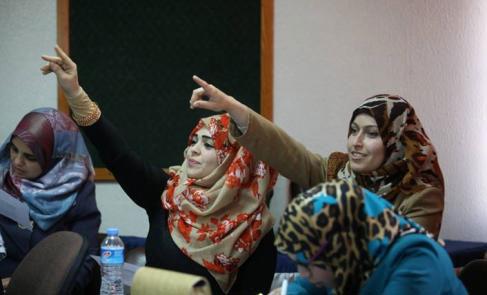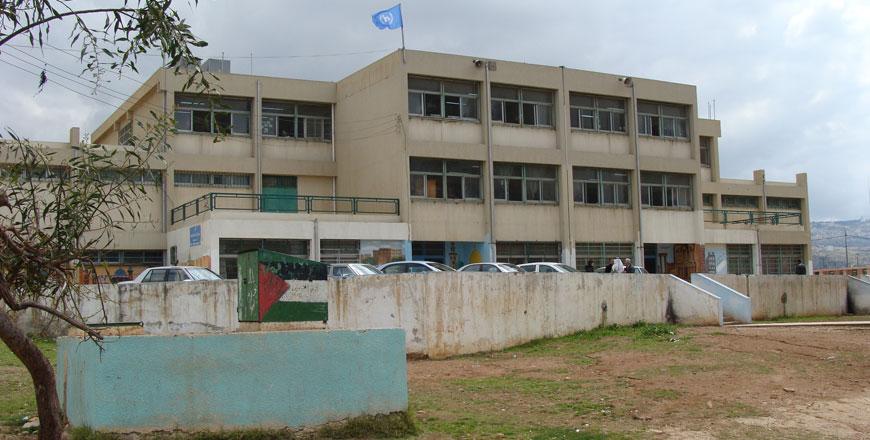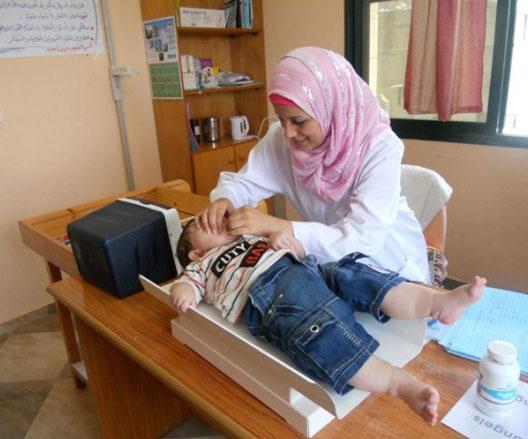You are here
Jordan: UNRWA should continue to offer services as long as Palestinian refugee problem exists
By Laila Azzeh , Petra - Jul 27,2015 - Last updated at Jul 28,2015

UNRWA’s education services are on the line due to a severe financial crisis (Photo courtesy of UNRWA)
AMMAN — Jordan on Sunday stressed that the United Nations should continue to offer services to Palestinian refugees as long as their plight continues, calling on the international community to help the struggling UNRWA, the UN agency caring for Palestinian refugees, cope with its escalating financial crisis.
As UNRWA’s advisory commission held an “extraordinary” meeting in Amman on Sunday to discuss the agency’s “most serious financial crisis” since its founding in 1949, the Cabinet was briefed on the escalating situation and the impact of any cuts in services offered to refugees.
Meanwhile, UNRWA employees staged a sit-in in front of the agency’s headquarters in Amman to protest plans to close 700 schools operated by the agency in its areas of operation by the beginning of the new scholastic year.
The commission said it will review the growing risks of delaying the start of the academic year in some 700 schools for half-a-million students across the Middle East unless a deficit of $101 million was covered, according to statement e-mailed to The Jordan Times.
The meeting in Amman brought together UNRWA’s “leading” donors and host governments.
In the statement, the agency noted that it is “alarmed that our current funding crisis may force us to consider a delay in the start of the school year. Such a decision would generate much anxiety and despair for hundreds of thousands of boys and girls.”
“Education lies at the very heart of the identity and dignity of Palestinian refugees and of what UNRWA stands for. Our schools also provide a measure of stability in a very unstable region. Possible delays in opening the school year would also have grave implications for host governments,” UNRWA said.
UNRWA in Jordan 2,097,338 registered Palestine refugees Ten officially recognised camps 173 schools, with 116,953 pupils Two vocational and technical training centres 23 primary health centres Eight community rehabilitation centres 12 women’s programme centres Figures as of July 1, 2014 |
At the Cabinet meeting, meanwhile, Deputy Prime Minister and Foreign Minister Nasser Judeh said he was in contact with officials in donor countries, stressing that the agency must continue to provide all its services to refugees without any exception
The minister said Jordan stands against any cuts or austerity measures that might affect the quality or scope of services, particularly in the education and health sectors.
This agency should continue to offer these services to Palestinian refugees “as long as the refugee problem continues to exist,” Judeh emphasized.
Due to the dwindling funding of the UN agency, Jordan does not accept any cuts in essential services, and if necessary, any cuts can target some administrative expenses, including the funds paid to advisers and experts, according to the Jordan News Agency, Petra.
The Cabinet meeting voiced “astonishment” over the international community’s decision to trim UNRWA’s budget at a time when it is calling on Jordan to receive Syrian and other refugees, according to Jordan News Agency, Petra.
Mahmoud Aqrabawi, director of the Department of Palestinian Affairs, told the Cabinet meeting that the agency has devised a plan to deal with the deficit, including a halt to recruitment, unless it was extremely necessary. It has also decided to end the services of 137 foreign advisers in the five countries of operation, besides allowing early and voluntary retirement.
UNRWA has been providing education, healthcare and social services to 5 million registered Palestinian refugees evicted from their homeland in the aftermath of the 1948 and 1967 wars, a number that includes all their descendants, living in Jordan, Lebanon, Syria, the West Bank and the Gaza Strip.
The agency’s leaders discussed a special report sent by the commissioner general to the UN Secretary General Ban Ki-moon and all the 193 UN state members.
As things currently stand, UNRWA has enough money to maintain its public health services, which include vaccinations, primary healthcare, relief and sanitation services until the end of the year. However, the “funding is insufficient to guarantee the stable provision of its educational services from September onward,” read the statement.
The agency called on all donors, partners and UN member states to actively step forward with critical funding to allow the school year to begin without interruption and to preserve the historic investment in human development of Palestinian refugees, “recognised as the most successful processors of its kind in the Middle East”.
Around 5,000 UNRWA educators out of the 22,000 employed in the agency’s five operation areas are in Jordan, the agency’s figures show.
Hundreds of UNRWA employees protested outside the agency’s headquarters in Amman against the anticipated cut in services.
The protesters expressed their fear over the fate of UNRWA, the safety network that was created solely to serve the Palestinian refugees since their exodus in 1948.
“Fine, close down UNRWA but give us back a free Palestine,” one of the protesters, who preferred anonymity, told The Jordan Times on Sunday.
Another employee, a father of five, expressed his shock because of the international community’s silence over what he described the “collapse of the backbone of support for Palestinian refugees”.
In earlier remarks, an UNRWA official noted that the “financial situation of the agency has reached a high level of difficulty with the commencement of July” and that efforts to bridge the budget gap “did not bode well”.
A number of UNRWA teachers told The Jordan Times recently that a series of measures will be taken to protest against the agency’s situation and anticipated steps to cut services.
In a bid to ease the impact of the crisis, the agency took a series of austerity measures, including eliminating general expenditures — general expenses that do not affect services — and terminating the contracts of a group of international consultants and those working short term.
“These measures did not help much,” said Mshasha.
The main reason that aggravated the financial difficulties of UNRWA is the “inability” of some donors, who have been loyal to the agency since 1950, to “keep up pace with the number of refugees and the growing number of whom who are falling under the poverty line”.
The other reason is related to the instability of regions that host Palestinian refugees, such as Syria and Gaza, which forced the agency to direct its spending to address emergency situation.
Also on Sunday, the Jordanian Democratic Popular Unity Party, members of whom took part in yesterday’s protest, described the development of UNRWA file as part of a “continued conspiracy to liquidate the Palestinian issue and deprive Palestinians of their right to dignity, freedom and the return to their homeland”.
Related Articles
AMMAN — UNRWA's financial woes and the complexity of its mission amid the regional unrest were featured high on the agenda of the agency's a
AMMAN – Jordan on Wednesday said it totally rejects any “shirking” of responsibilities towards UNRWA, the only UN agency that is dedicated t
AMMAN – UNRWA schools will open on time after nearly three months of anticipation over the fate of its educational programme.


















